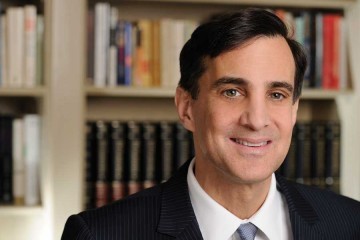An editorial published Sunday by The Baltimore Sun takes a look at recent efforts by Johns Hopkins University President Ronald J. Daniels to call attention to the issue of declining funding for young researchers and sounds a hopeful note on the prospect of bipartisan congressional support to address the problem.
In a recent article published in the journal Proceedings of the National Academy of Sciences, Daniels noted that America's youngest scientists are increasingly missing out on research dollars and leaving the academic biomedical workforce, a brain drain that poses grave risks for the future of science. The age at which these researchers are getting their first major grants from the National Institutes of Health has steadily advanced during the last few decades, Daniels writes, from 38 in 1980 to 45 in 2013. Today, twice as many researchers over age 65 are getting these grants than those age 36 or younger, the reverse of the situation 15 years ago.
Daniels also appeared as a guest on WAMU's The Kojo Nnamdi Show last week to discuss the research funding crunch.
In its editorial, The Sun noted that a federal government solution could be on the horizon:
Read more from The Baltimore SunFortunately, both parties in Congress are working on the issue in ways that suggest it could prove an exception to the gridlock that has otherwise overtaken Washington. Last week, Rep. Fred Upton, the Michigan Republican who chairs the House Energy and Commerce Committee, released a nearly 400-page draft proposal for reforms to the NIH and the Food and Drug Administration designed to speed the discovery and approval of new treatments and cures. Rep. Andy Harris, a Maryland Republican and a physician who has conducted NIH-supported research in the past, contributed several ideas to prod the NIH into supporting younger researchers and more high risk/high reward proposals. Meanwhile, Maryland's Sen. Barbara Mikulski last week introduced legislation to partially exempt the NIH from Congress' self-imposed budget caps in hopes of restoring the agency's purchasing power after more than a decade of flat funding.
In all of that, there could be the makings of a deal.
Posted in University News, Voices+Opinion










